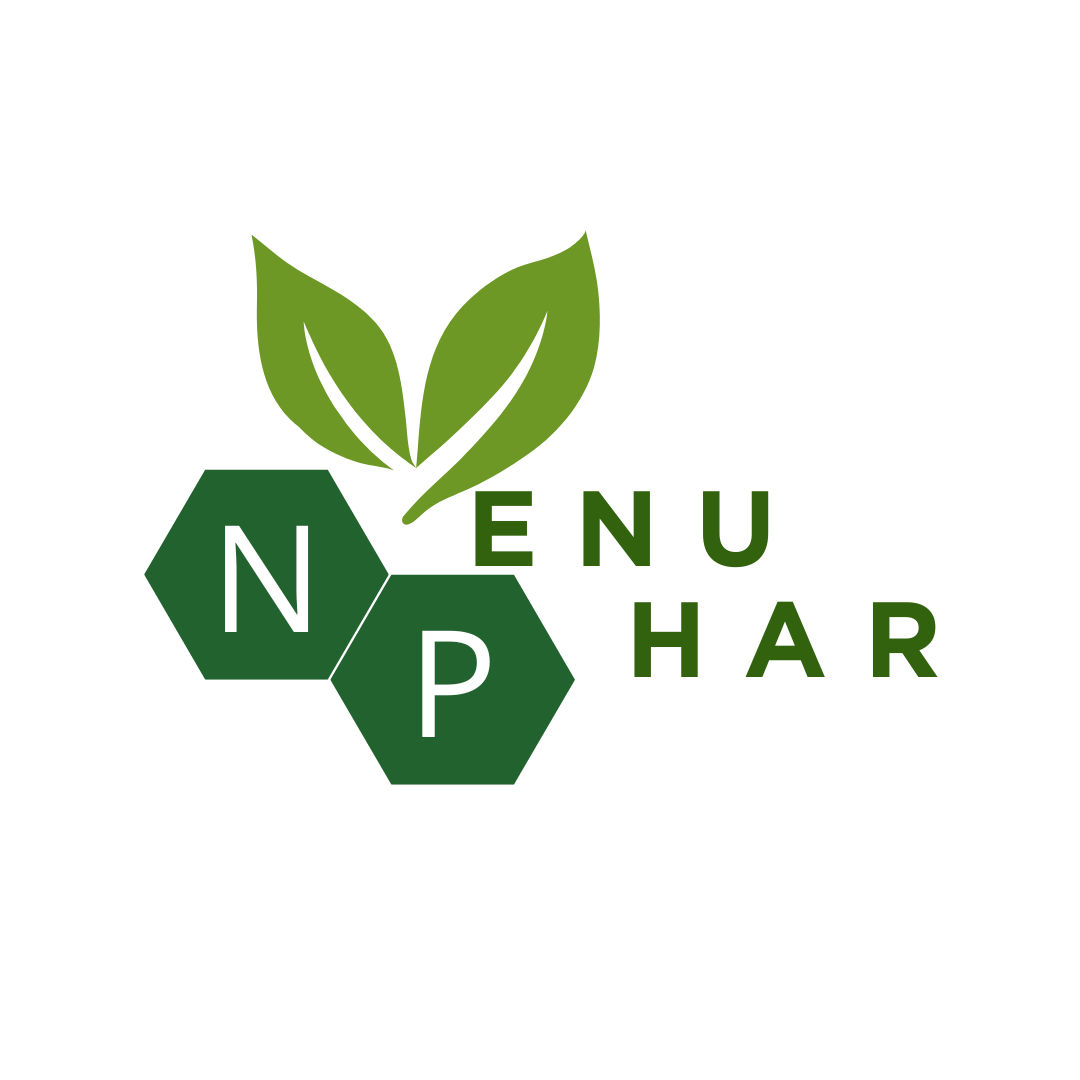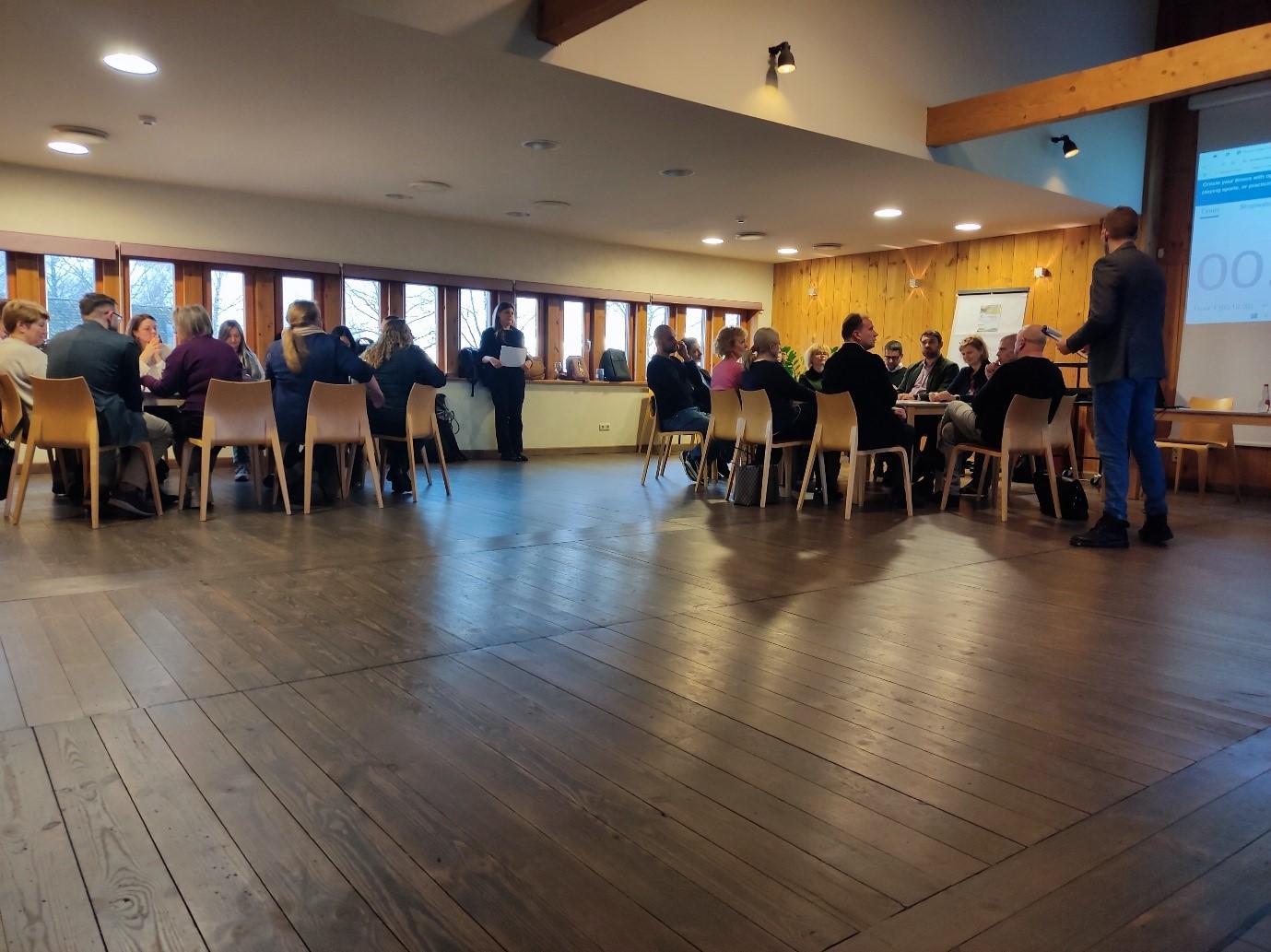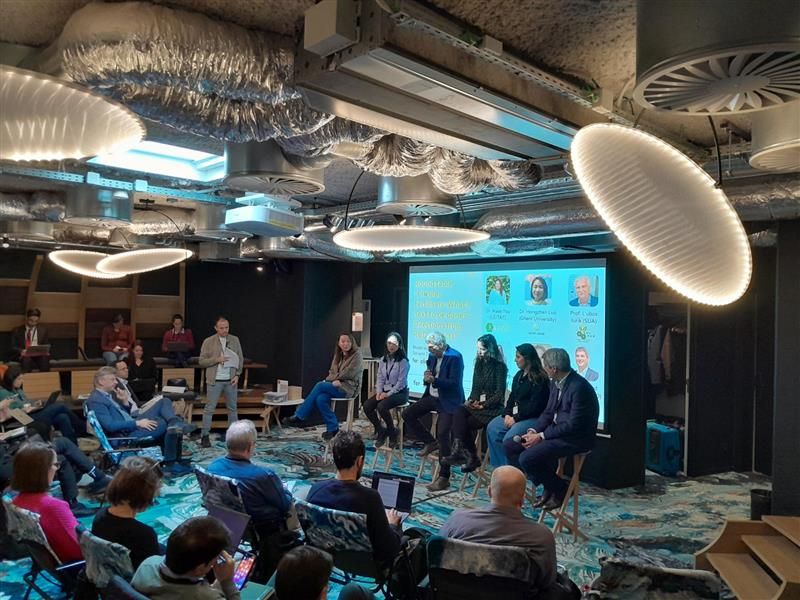Welcome to the first newsletter of the NENUPHAR project!
In this edition:
– Project kick-off
– FIMA 2024
– Wastewater and composting treatment in the Baltics
– Latvia’s demo site moves ahead
– Promising developments on sewage sludge
– Results on composting
– NENUPHAR’s work in the Danube River basin starts to flow
Want to receive the newsletter in your mailbox? Subscribe here: https://lnkd.in/eHjgAWRz
Project kick-off
In November, we all came together in Zaragoza, Spain to put faces to names and get the NENUPHAR project officially underway. Kindly hosted by our project partner CIRCE, we heard presentations from partners covering all of the work packages.
We had a chance to learn about not only the various technical demo cases across Europe developing solutions for minimising nutrient pollution and maximising its circular economy potential, but also some of the less visible, but equally important work, being carried out by the consortium.

FIMA 2024
In February, NENUPHAR attended a major international fair showcasing innovative solutions to today’s agricultural challenges. With participation from our partners CIRCE, GESTCOMPOST, Confederacion Hidrografica del Ebro, BETA Technological Center, Fundació Universitària Balmes and the Community of Irrigators of Aragon and Catalonia (CAYC), the NENUPHAR project was well-represented at this high-level event.
With a particular focus on the work being carried out in the Ebro river basin in Spain’s regions of Aragon and Catalonia, we heard about the technological solutions for reducing Nitrogen and Phosphorus pollution, as well as how we can develop regimes for better recycling these nutrients!

Wastewater and composting treatment in the Baltics
Our project partners Zemnieku Saeima started the year with the kick-off meeting of the Lielupe River Basin Team. Together with colleagues from Latvia University of Life Sciences and Technologies (LBTU) and the Latvian Water Supply and Sewerage Companies Association (LUKA), they travelled to Šiauliai in Lithuania to meet with Lithuanian Project Partners from the Vytautas Magnus University (VMU) and the National Regional Development Agency (NRDA).
At the meeting they discussed the work to be done together – the development of a detailed methodology for sewage sludge composting and application to agricultural land, as well as demonstrations on several farms in the Lielupe river basin. With a focus on both countries, this get-together helped to coordinate the approaches required for the implementation of the demo case and sludge composting, as well as to inform one another of any potential risks.

February
In February, Zemnieku Saeima visited the Liepāja Water Treatment Plant in the West of Latvia to further inform their approach to wastewater sludge composting and treatment technology development. The visit was organised by the Latvian Water and Wastewater Works Association (LUKA), and was also attended by colleagues from the Latvia University of Life Sciences and Technologies (LBTU), and warmly hosted by the Liepaja Water Ltd. team.
During the visit, wastewater treatment plant specialists introduced partners to the wastewater sludge treatment process, as well as their own sewage sludge composting experience. We discussed possible cooperation and ways in which we plan to improve the composting technology by testing the addition of different amendments as well as the monitoring approaches to ensure the highest possible contribution to agricultural land.

April
In April, Zemnieku Saeima hosted the Lielupe River Basin team in Ceraukste, organising the team’s second face-to-face meeting. They agreed on criteria for the selection of demo farms, which are essential for the successful incorporation of composted sewage sludge into agricultural land using the new technology. Equally important was the issue of the testing programme – together they continued to work on a plan for what parameters will be tested in the sewage sludge before and after composting, what parameters should be tested before they are added to the compost, and the conditions for testing soil and water samples. Plans were also made to visit wastewater treatment plants in Lithuania – stay tuned!
To ensure that the results of the project reach all relevant stakeholders, work is underway to form a Project Steering Group in the Lielupe River basin, and ZS have invited representatives of relevant stakeholders from the Ministries of Agriculture, Climate and Energy, Environmental Protection and Regional Development as well as the Latvian Union of Municipalities to join the group in Latvia.

NENUPHAR wants you – spread the word!
With a view to reviewing the approach of applying the composted sewage sludge to the fields, to ensure the accuracy of the application methods and to meet the other project objectives, Zemnieku Saeima are looking for a colleague to join the team and contribute to the project in the field of agriculture.
Latvia is actively seeking farms to participate in demonstrations. Zemnieku Saeima are now inviting farms to apply and making sure that they meet the conditions that will lead to successful results. Farms must not only be interested in participating, but also meet the criteria that will allow successful testing of soil and water samples in the demo area.

Latvia’s demo site moves ahead
Latvia University of Life Sciences and Technologies (LBTU) has had a busy 2024 so far, actively contributing to meetings organised by the Lielupe River Basin team including the meeting in Šiauliai (Lithuania), Liepaja (Latvia), and Ceraukste (Latvia near the border with Lithuania).
In collaboration with the Farmers Parliament, Latvian Water and Wastewater Works Association, Vytautas Magnus University (VMU) and National Regional Development Agency, LBTU has been advancing the preparatory work for the Lielupe River Basin demonstration site, including developing the criteria for selection of demonstration farms, and list of substances and quality parameters to be analysed in the process of preparation composted sewage sludge, as well as before and after application of composted sewage sludge on agricultural fields. Raw sludge, aggregates, ready-to-go compost, soil, and water samples will be tested for chemical and microbial parameters according to the regulations set by the national legislation and beyond.
With a view to maximising the reach and uptake of NENUPHAR’s solutions, LBTU has also conducted market research needed before initiating several procurement procedures to purchase equipment and instrumentation to be applied for water quality and quantity monitoring activities.

Promising developments on sewage sludge
The personnel of Latvian Water and Wastewater Works Association (LUKA) have participated and actively contributed to the meetings organised by the Lielupe River Basin team including the meeting in Šiauliai (Lithuania), and Ceraukste (Latvia near the border with Lithuania).
In February, LUKA organised a regional partner meeting in Liepaja WWTP to evaluate the possible sludge processing technologies that might be applied in Latvia.
During the visit, WWTP specialists introduced them to the wastewater sludge treatment process, as well as their own sewage sludge composting experience. They discussed possible cooperation and plans to improve the composting technology by testing the addition of different amendments as well as the monitoring approaches to ensure the highest possible contribution to agricultural land. At the end of the meeting, they toured the company’s treatment plant site and looked at the operations, including the results of the current composting method.

Results on composting
In March, representatives from Vytautas Magnus University (Lithuania), with partners from the National Regional Development Agency (NRDA), visited the “Biržų Vandenys” WWTP, where they familiarised themselves with the wastewater treatment and sludge composting process. The company “Biržų Vandenys” voluntarily agreed to participate in the project and provide composted sludge, which will be spread on agricultural land and serve as a demo site in the Lielupe River Basin.
In 2023, the amount of wastewater treated in the WWTP facilities of Biržai city was 984,000 cubic metres. On average, 375 tons of sewage sludge and 430 tons of composted sludge are generated annually there. The amount of organic matter in the sludge varies between 45% and 60%. The total nitrogen content varies between 2% and 3%, and the total phosphorus content between 1.3% and 2.6%. These are valuable nutrients that, in the longer perspective, could replace chemical fertilisers!
According to wastewater treatment regulations adopted in the country, the levels of heavy metals (Pb, Cd, Cr, Cu, Ni, Zn, Hg) and microbiological indicators in the composted sludge of Biržai WWTP are suitable for application as fertiliser in the fields. Therefore, local farmers interested in spreading the sludge on their own land also attended the meeting. Fields where demonstration sites are planned to be installed, along with locations for water monitoring wells, were surveyed. There was a useful discussion on how to adapt demonstration sites for the implementation of project activities. Information about the objectives and tasks of the NENUPHAR project was disseminated on the company’s website.


NENUPHAR’s work in the Danube River basin starts to flow
In December, the first meeting was held on NENUPHAR’s Danube River basin demo site. Partners from SZE were hosted by SUA in Nitra. The first meeting on the Danube River demo site, it successfully established closer cooperation and discussion on the similarities and differences of the two wastewater treatment methods being under development/modification at the Danube River demo site region.

In January, a new team member joined NENUPHAR project: Marta Lenartowicz, hailing from the picturesque city of Gdansk, Poland. Marta recently completed her studies in Biotechnology at the University of Warmia and Mazury in Olsztyn.



